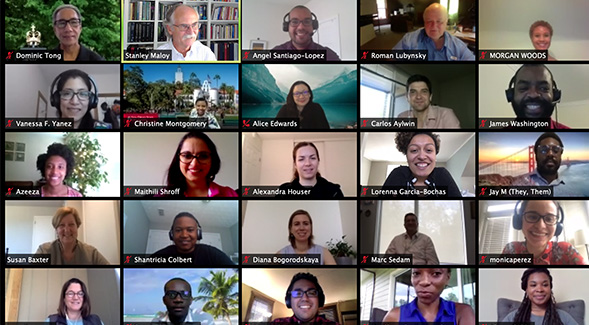Fostering Inclusive Innovation
A workshop created by SDSU innovators encourages a diverse group of biotech faculty to consider themselves entrepreneurs.

“We understand entrepreneurship from personal experience, it's not just teaching theoretical concepts.”
Therapeutics. Medical Devices. Agricultural Products. Environmental Sensors.
Innovations in crucial biotechnology areas like these require entrepreneurs who are not only at the forefront of emerging science, but who can leverage their discoveries to meet today’s critical needs.
Yet university faculty often struggle to bridge the gap between their research and the startup world, and their discoveries or inventions never leave the lab as a result. This is especially true for underrepresented faculty — women, researchers of color and first-generation scientists — who don’t always see themselves represented in existing entrepreneurship ecosystems.
Three San Diego State University researchers and entrepreneurs — along with colleagues at the University of New Hampshire, the Massachusetts Institute of Technology (MIT), the University of Oregon Bio Organization, and the United Negro College Fund (UNCF) — developed a National Science Foundation-funded workshop to address this pervasive problem head-on and encourage entrepreneurship among a diverse set of faculty with expertise in biotechnology. In its fourth year, the workshop has trained 80 early-career faculty at nearly 50 universities, ranging from MIT to right here at SDSU.
The workshop, Bio I-Corps, is a spinoff of the National Science Foundation (NSF) Innovation Corps program, which teaches researchers how to develop innovations based on federally funded research.
Research shows that a small fraction of startup funding goes to underrepresented minorities and females. Bio I-Corps aims to capture that group — 68% of participants in the recent workshop were women, 42% black and 42% Hispanic — and the curriculum addresses distinct hurdles faced by underrepresented faculty in biotech fields.
“In the workshop space, gender and ethnicity were sources of inclusion and empowerment, which is often not the case in academia and beyond,” one participant noted in an anonymous survey.
Instructors profiled the program in the September 2020 issue of Nature Biotechnology. Faculty from SDSU include: Stanley Maloy, associate vice president for research and innovation; Cathy Pucher, executive director of the Zahn Innovation Platform (ZIP) Launchpad; and Susan Baxter, a professor and former leader of the California State University Program for Education and Research in Biotechnology.
SDSU has taken many steps to continuing progressing its research prowess and will continue to strive to become a premier public research institution as evident in the university’s new five-year strategic plan, “We Rise We Defy: Transcending Borders, Transforming Lives.” The strategic plan also calls for the prioritization of diversity of students, faculty and staff.
Authors argued that startup support “should not be reserved for industry insiders, the well-connected or residents of biotech hubs,” but should be available to a “diverse continuum of entrepreneurial-minded researchers.” They identified concrete ways to encourage underrepresented faculty to consider entrepreneurship, including:
- Build inclusive teams and mentor networks: “Building a supportive community is crucial for all bioentrepreneurs, but especially so for underrepresented entrepreneurs aiming to win commercialization grants, land early rounds of financing or involve knowledgeable industry insiders,” the authors note, adding that “many mentor networks lack sufficient diversity.”
- Nix the ‘Shark Tank’ element of training: Competitive boot camp programs can discourage underrepresented scientists. “The experience of receiving harsh feedback, delivered by instructors or expert panels that lack diversity, can be especially alienating and discouraging for early-career researchers who do not see themselves represented by teaching team members and industry professionals in the room,” authors note.
- Help with ideation and implementation phases: Faculty need resources to learn the tenets of successful startups, from intellectual property barriers to commercialization to potential markets. Yet authors note “campuses distant from biotech hubs, primarily undergraduate institutions and historically black colleges and universities, may lack the technology transfer expertise” needed to support faculty entrepreneurs.
- Prepare faculty long before they have an advanced idea: The Bio I-Corps program is for faculty who aren’t engaged in entrepreneurship, but who want to learn more. By not requiring a developed concept, “the workshop opens up opportunities to experience the biotech ecosystem and gain commercialization insights previously perceived as out-of-reach or closed to under-represented, first-generation researchers and nascent entrepreneurs,” the authors note.
The workshop, which integrates these ideas, has found success in its four years. In post-workshop surveys, 84% of participants reported changing the way they approach research because of the workshop and all of them reported growing their professional network.
“Every member of the teaching team has been through this process. We understand entrepreneurship from personal experience, it's not just teaching theoretical concepts,” Maloy said. “When we discuss the importance of teams and diverse groups, we can give concrete examples and stories about our own experiences that resonate with faculty.”



